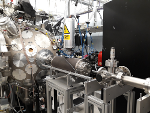LhARA Institute Board meeting #6
8th February 2023 17:30 BST
Present
Phil Burrows, Amato Giacca, Stuart Green, Tim Greenshaw, Harry Hall, Gareth Jones, Ken Long, Jason Parsons, Jaroslaw Pasternak, Tony Price, Colin Whyte.
Notes from last meeting (TG, YP)
Notes of the meeting on the 4/10/22
No alterations made.
Report from the co-spokespeople (KL, AG)
Ken Long stressed need to find additional resource for LhARA.
Discussed developing Accelerator Consortium, which LhARA hopes to contribut to and receive support from. The laser/plasma element was refocused shortly before the Collaboration Meeting and is now centred on electron acceleration, rather than protons/ions. LhARA will seek to strengthen collaboration with Queens, Strathclyde and other institutes who have an interest in proton and ion acceleration, with a view to accessing funds from future calls.
The development of Gabor lenses would benefit many researchers, but no further sources of support have yet been identified. Again, LhARA must work to find new collaborators.
The muon work to be carried out by the Accelerator Consortium will aid LhARA's FFA development.
Jason Parsons and Amato Giacca are leading a LhARA bid to the MRC developmental pathway funding scheme, in discussion with Yolanda Presado and and Kevin Prise. This will hopefully provide some funding and will certainly ensure we clearly articulate our radiobiology programme and are well prepared for future calls.
The wiki still needs some work and the general LhARA web presence needs improvement.
Report from the project manager (CW)
There was discussion of the need to make clear the transformative nature of the radio-biology programme that LhARA makes possible. The possibilty that LhARA technology will allow the provision of radiotherapy at significantly reduced cost was also emphasised.
LhARA MoU (TG, YP)
Current draft of MoU is attached below.
Changes from the previously circulated draft are:
Preamble
Addition of reference to description of LhARA provided in "The Laser-hybrid Accelerator for Radiobiological Applications" on the wiki. Addition of comments on radiobiology programme LhARA will pursue and clinical impact it will achieve.
Institute Board
Add ratification of Biological Science Programme Manager and Impact Programme Manager appointments to the role of the IB.
Add ITRF representative as non-voting member on IB. Following discussion, it was decided this wasn't necessary: there are already sufficent channels of communication between ITRF and LhARA
Establishment of Science Board (TG, YP)
As foreseen in the MoU, Science Board, led by two Project Scientists, will steer LhARA's science programme. E.g. it will be the body responsible for issuing calls for proposals for the use of the LhARA facility and setting up peer review to determine how LhARA time is apportioned.
In the shirter term, the SB should take responsiblity for guiding major publications through the collaboration and ensuring LhARA representation at conferences.
Two names proposed as Project Scientists: Robert (Bob) Bingham, Strathclyde, CLF. Kevin Prise, QUB. Both approved by the IB.
LhARA funding (All)
Search of UKRI finding calls led to identification of MRC developmental pathway funding scheme. https://www.ukri.org/opportunity/developmental-pathway-funding-scheme/ Amato and Jason preparing LhARA bid, see above.
In addition, some schemes for Doctoral Training Centres were found, e.g. UKRI Centres for Doctoral Training in AI https://www.ukri.org/opportunity/ukri-centres-for-doctoral-training-in-artificial-intelligence/ Not something LhARA can apply to as a collaboration, but may be possible for individual LhARA members to work in DTCs in their universities funded through this scheme. (Deadline 23/2/23!)
Request was made that all keep eyes open for funding opportunities and keep LhARA informed!
MoU may be useful to ensure coherence of project can be demonstrated in bids for funding for elements of programme.
It was noted that Innovate UK will step up activities in the next few years. These are not aimed at supporting basic research, but may be of interest when commercialisationis considered.
LhARA needs to assess sustainability issues and estimate operation costs in preparation for future funding bids.
AoB
Amato Giacca reminded us to thick about year 3 of the LhARA programme and beyond and the next funding round. Questions of interest include: Where should the LhARA prototype be developed? Would people's institutions be interested in hosting LhARA and what support could they provide? What associated facilities are needed (e.g. an animal house, laser Lab.)?
DoNM
Will take place as part of next Collaboration Meeting.
Attachments (1)
-
LhARA-MoU-230131.pdf
(158.3 KB
) - added by 3 years ago.
LhARA draft MoU
Download all attachments as: .zip
